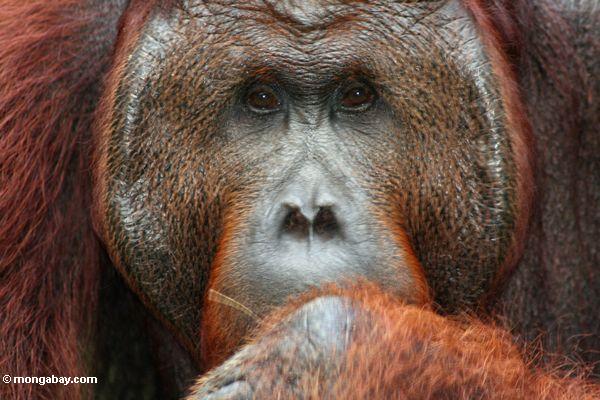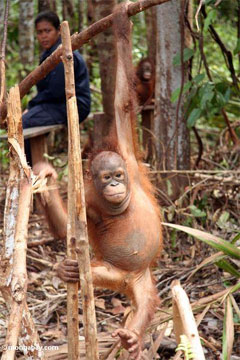Adult male Bornean orangutan. Photo by Rhett A. Butler.
Two Indonesian plantation companies have signed an agreement to train workers not to kill or injure orangutans and other protected species.
The agreement was brokered by the Indonesian government between Orangutan Foundation International (OFI), a non-profit with operations in Central Kalimantan, Indonesian Borneo, and two major plantation firms: PT Smart, one of Indonesia’s largest palm oil producers, and PT Lontar Papyrus, which supplies wood-pulp to Asia Pulp & Paper (APP). Both companies are holdings of the Sinar Mas Group.
Under the terms of the deal, OFI will assist the companies “in delivering a best management practices training program on orangutans and endangered species for its employees, affiliates and pulpwood suppliers.”
The agreement further commits PT Smart and PT Lontar to “introduce and implement a ZERO-TOLERANCE policy regarding protected species under the laws of Indonesia as part of their environmental policy. This means that PT Londar staff or employees who are discovered killing, hurting, owning, buying or selling any individual animal or animals from an endangered or protected species under the laws of Indonesia will be immediately suspended and investigated according to the laws and regulations of Indonesia.”
The agreement was reached after six months of negotiations, according to Birute Mary Galdikas, the founder of Orangutan Foundation International and a globally-recognized expert on orangutans.
 Young orphaned orangutan feeding while hanging from tree. Photo by Rhett Butler. |
Dr. Galdikas told mongabay.com the deal has wide-ranging implications for protection of orangutans, which are frequently viewed as threats to plantations and killed. Last month an investigation revealed that a Malaysian plantation company operating East Kalimantan had paid a bounty of $110 to workers for each orangutan they killed.
“If any of their employees are caught killing, hurting, selling, etc. individual animals of any endangered species, the employee will be immediately suspended and the charge investigated and reported to the police,” she said via email. “If guilty, the employee will be fired. This constitutes a radical change in the companies’ policies.”
“We insisted on providing a training program to all managers and employees in Smart’s/Lontar’s holdings concerning the implementation of the zero tolerance policy. The two companies also agreed to include, as part of the training program, managers and employees getting first hand experience with orangutans and other protected wildlife at credible field sites in the wild.”
Erik Meijaard, an ecologist who has studied orangutans extensively in Kalimantan, called the agreement, at first blush, a positive development.
“Of course protected species should not be killed, but we know that this is happening all the time in plantations and other forest areas,” he told mongabay.com via email. “A zero tolerance attitude, if enforced and preferably independently verified, is an excellent initiative, which would significantly increase the wildlife value of plantations.”
“Whether or not it can be realistically enforced is another question, especially when clearing of natural forest is involved. Staff may not directly kill wildlife but by removing their resources or displacing them to other non-forest areas, it certainly becomes more likely that the animal will die – note that such indirect killing is not illegal under Indonesian law.”
Greenwashing concerns
Galdikas said her group initially expressed concerns about the agreement given both companies’ environmental record. PT SMART was targeted by Greenpeace and other environmental groups for converting rainforests and peatlands to oil palm plantations in Indonesian Borneo, while APP has been criticized for clearing vast expanses of key habitat in Sumatra. Both PT SMART and APP have been accused of using support for conservation initiatives to “greenwash” their image, but PT SMART seems to have redeemed itself in the eyes of some NGOs when earlier this year its parent company Golden-Agri Resources (GAR) signed a comprehensive forest policy that prohibits conversion of ecosystems that store more than 35 tons of carbon per hectare and commits the company to “free, prior informed consent” (FPIC) in dealing with local communities.
“When negotiating with PT Smart and PT Lontar, we actually voiced concern about the credibility of APP’s conservation initiatives and made the point that the conservation initiatives which they explained to us seemed very self-serving,” said Galdikas. “We were not interested in anything similar but wanted to have a direct effect on their companies’ policies in the field. We wanted to make a direct and immediate difference to the animals on the ground.”
“This is not greenwashing. This is serious.”
The two companies also agreed to help Rimba Raya Conservation, a forest carbon developer, obtain a conservation forest for the 330 wild born ex-captive orangutans that OFI needs to release from its Orangutan Care Center and Quarantine in the village of Pasir Panjang in Central Kalimantan.
“Certainly, the palm oil companies have a lot more influence in high places than any conservation group does,” said Galdikas. “Before the training agreement was signed, PT SMART and Lontar started lobbying, at the ministerial level, for this forest to be saved. They continue to do so. This genuine gesture of good faith, along with agreement to institute a zero-tolerance policy concerning all endangered species, convinced us that it was possible to work with them and that we could actually influence their policies at the highest level.”
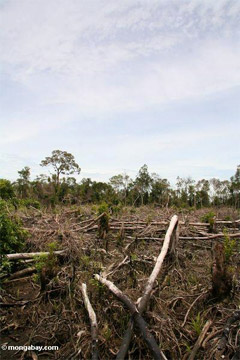 Forest clearing for an oil palm plantation on the border of Tanjung Puting National Park. Photo by Rhett Butler. |
Galdikas added that OFI “did not initially ask for funds. We demanded access to the companies’ holdings and policies.”
“We want to influence the way that these companies work in the field,” she continued. “We demanded that PT Smart and Lontar change their policies and start protecting wildlife and habitat in a real way.”
Galdikas said she hopes the policies could eventually be adopted by other palm oil and wood-pulp suppliers under the Sinar Mas umbrella of companies, including overseas operations.
“One of the reasons I was excited about signing this agreement with PT Smart and Lontar is that their sister companies are opening up plantations in Africa,” she said. “I hope that, under this agreement, we can insist that the new zero tolerance policy on endangered species be exported to their African holdings.”
The risks to wildlife from plantations in Indonesia is indeed real. A study published last month in PLoS One found that conflict between orangutans and humans is worst in areas that have been converted for timber, wood-pulp, and palm oil production. It concluded that orangutans are currently being killed at a rate faster than they can reproduce, suggesting that orangutans could go extinct outside protected areas.
“These killing rates… are high enough to pose a serious threat to the continued existence of orangutans in Kalimantan,” wrote the authors, led by Meijaard. “The data suggest no orangutans outside Kalimantan’s protected areas are safe.”
Galdikas agreed.
“Orangutan killing is the dirty big secret of the palm oil and pulp and paper concession world,” she said. “Habitat is crucial but it’s important to save the animals themselves.”
Related articles
Report questions legitimacy of Asia Pulp & Paper’s conservation initiatives
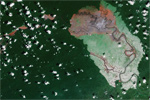
(11/22/2011) A new report by an Indonesian environmental group casts doubt on Asia Pulp & Paper’s commitment to sustainability. In its corporate social responsibility reports and advertisements, Asia Pulp & Paper (APP), one of Indonesia’s largest pulp and paper suppliers, has touted several forest reserves as indicators of its commitment to environmental stewardship. APP has portrayed these as voluntary, goodwill efforts to conserve Sumatra’s endangered wildlife. But in a new report, Greenomics-Indonesia, a Jakarta-based NGO, says that at best these projects represent compliance with existing Indonesian laws or are in areas where commercial exploitation isn’t viable.
War of words between Greenpeace, Asia Pulp & Paper over deforestation allegations

(11/16/2011) Greenpeace and Asia Pulp & Paper (APP), a giant global paper supplier, are locked in a heated battle over the activist group’s allegations that APP products contain fiber sourced from the destruction of forests in Indonesia. At stake is APP’s access to some of the world’s most lucrative markets. Until APP provides solid evidence refuting Greenpeace’s accusation that its pulp and paper production isn’t coming at the expense of natural forests in Indonesia, APP will have a difficult time winning over critics.
Orangutans in Indonesian Borneo doomed to extinction?

(11/14/2011) A new study finds orangutans in Indonesian Borneo in unprotected areas are being killed at a rate faster than what population viability analysis considers sustainable. Conflict between orangutans and humans is worst in areas that have been fragmented and converted for timber, wood-pulp, and palm oil production, but hunting is occurring in relatively intact forest zones away from industrial development.
Paper suppliers risk damaging Indonesia’s reputation, argues report
(10/07/2011) Indonesia needs to re-evaluate forest areas and peatlands granted for pulp and paper plantations to reduce the risk of damaging the international reputation of its forest products and undermining its commitment to greenhouse gas emissions reductions, argues a new report published by an Indonesian activist group.
Asia Pulp & Paper to undertake human rights audit
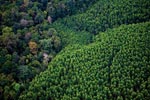
(09/22/2011) Paper products giant Asia Pulp & Paper (APP) will undertake a human rights audit across its Indonesian operations. The move, which APP says is an acknowledgment of a recent United Nations call for the global protection of human rights by businesses, comes as APP intensifies its effort to improve its image abroad. APP, a brand for paper products manufactured by several subsidiaries in Indonesia, has been beset by criticism from environmental and human rights group over its development of timber plantations on the island of Sumatra. The complaints have cost APP a number of prominent customers.

(07/27/2011) Indonesia’s forests were cleared at a rate of 1.5 million hectares per year between 2000 and 2009, reports a new satellite-based assessment by Forest Watch Indonesia (FWI), an NGO. Expansion of oil palm and wood-pulp plantations were the biggest drivers of deforestation, yet account for a declining share of the national economy. The study, which compared year 2000 data with 2009 Landsat images from NASA, found that Indonesia’s forest cover declined from 103.32 million hectares to 88.17 million hectares in ten years. Since 1950 Indonesia lost more than 46 percent of its forests.
Pro-deforestation group criticizes palm oil giant for sustainability pact
(03/24/2011) World Growth International, a group that advocates on behalf of industrial forestry interests, has criticized Golden Agri Resources (GAR), Indonesia’s largest palm oil producer, for signing a forest policy that aims to protect high conservation value and high carbon stock forest and requires free, prior informed consent (FPIC) in working with communities potentially affected by oil palm development. In a newsletter published March 10, World Growth International claimed that GAR’s agreement “could severely hamper the company’s growth” by limiting where it can establish new plantations and says that negotiating with multiple stakeholders “will delay and complicate any investment by the company.” World Growth International concludes by implying that GAR may renege on its commitment. But Peter Heng, Managing Director, Communications and Sustainability at GAR, disagreed with World Growth International’s assessment.
Pulp and paper firms urged to save 1.2M ha of forest slated for clearing in Indonesia
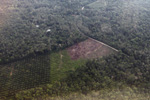
(03/17/2011) Indonesian environmental groups launched a urgent plea urging the country’s two largest pulp and paper companies not to clear 800,000 hectares of forest and peatland in their concessions in Sumatra. Eyes on the Forest, a coalition of Indonesian NGOs, released maps showing that Asia Pulp and Paper (APP) and Asia Pacific Resources International Limited (APRIL) control blocks of land representing 31 percent of the remaining forest in the province of Riau, one of Sumatra’s most forested provinces. Much of the forest lies on deep peat, which releases large of amount of carbon when drained and cleared for timber plantations.
Breakthrough? Controversial palm oil company signs rainforest pact

(02/09/2011) One of the world’s highest profile and most controversial palm oil companies, Golden Agri-Resources Limited (GAR), has signed an agreement committing it to protect tropical forests and peatlands in Indonesia. The deal—signed with The Forest Trust, an environmental group that works with companies to improve their supply chains—could have significant ramifications for how palm oil is produced in the country, which is the world’s largest producer of palm oil.
Does chopping down rainforests for pulp and paper help alleviate poverty in Indonesia?

(01/13/2011) Over the past several years, Asia Pulp & Paper has engaged in a marketing campaign to represent its operations in Sumatra as socially and environmentally sustainable. APP and its agents maintain that industrial pulp and paper production — as practiced in Sumatra — does not result in deforestation, is carbon neutral, helps protect wildlife, and alleviates poverty. While a series of analyses and reports have shown most of these assertions to be false, the final claim has largely not been contested. But is conversion of lowland rainforests for pulp and paper really in Indonesia’s best economic interest?
Pulp plantations destroying Sumatra’s rainforests

(11/30/2010) Indonesia’s push to become the world’s largest supplier of palm oil and a major pulp and paper exporter has taken a heavy toll on the rainforests and peatlands of Sumatra, reveals a new assessment of the island’s forest cover by WWF. The assessment, based on analysis of satellite imagery, shows Sumatra has lost nearly half of its natural forest cover since 1985. The island’s forests were cleared and converted at a rate of 542,000 hectares, or 2.1 percent, per year. More than 80 percent of forest loss occurred in lowland areas, where the most biodiverse and carbon-dense ecosystems are found.
